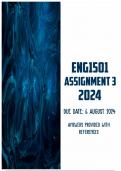, PLEASE USE THIS DOCUMENT AS A GUIDE TO ANSWER YOUR ASSIGNMENT
Please note that the author of this document will not responsibility for any plagiarizing you
commit.
Section A - Reflective Essay
In 300 – 400 words reflect on Unit 4 of your study guide and how it relates to your prior
knowledge and experience, as well as how it has informed your appreciation of novels. Write
your reflections in paragraph form guided by the questions below.
Have you read any novels? If so, what types of novels have you read? (When we refer to a
type, we really mean a “genre”. A genre refers to the categories into which novels can be
classified, such as crime novels, romance novels, science fiction or fantasy novels. Share the
title and author of a South African novel you have read (if you have read one). Does it have
any similarities with Small Things? Mention a few.
When working through Unit 4, which parts of this unit were the clearest to you? (Elaborate)
Which ones did you struggle with? (Expand)
Did you find the prescribed novel interesting and was it easy for you to read? What made the
novel interesting? Did you dislike this novel? If so, why did you dislike it?
Reflecting on Unit 4 of the study guide and its relationship to my prior knowledge and experience
with novels, I find that this unit has significantly deepened my understanding and appreciation of the
novel as a genre. Previously, my reading experiences included various genres such as science fiction,
fantasy, and romance. One South African novel I have read is "July's People" by Nadine Gordimer.
This novel, like "Small Things" by Nthikeng Mohlele, explores themes of socio-political change and
personal transformation in the context of South Africa. Both novels offer a deep introspection into
the lives of their characters against the backdrop of societal upheaval, highlighting issues of identity,
power, and human connection.
Unit 4 of the study guide is structured to guide readers through the complexities of the novel form,
building on concepts introduced in earlier units. The parts of the unit that were clearest to me
included the discussions on the formal characteristics of the novel genre, such as setting,
characterisation, narration, and plot. These sections were well-explained and built logically on my
existing understanding from Unit 3, which dealt with short stories. I found the activities designed to
unpack these elements particularly helpful as they encouraged a close reading and deeper analysis of
"Small Things".
However, I did struggle somewhat with the sections on writing a critical essay on the novel. While
the guidelines provided were comprehensive, the task of synthesising all the elements into a cohesive
argument felt challenging. The requirement to engage deeply with textual evidence and employ
literary terms in my analysis demanded a level of critical thinking and articulation that I am still
developing.
Despite these challenges, I found "Small Things" to be a fascinating and engaging read. The novel's
intricate exploration of post-apartheid South African society, through the lens of a deeply personal
narrative, made it both relatable and thought-provoking. The author's use of vivid imagery and
nuanced character development drew me into the protagonist's world, making the novel a compelling
study of resilience and human spirit.





